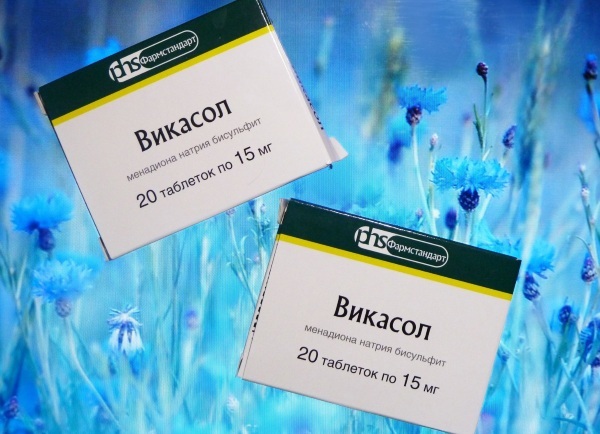Stop bleeding effectively from the uterus in several ways. The choice depends on its kind of reason. Bleeding can be physiological (during menstruation) or pathological with various gynecological pathologies.
Record content:
- 1 What is uterine bleeding?
- 2 The action of hemostatic drugs
-
3 How to stop bleeding during menstruation at home
- 3.1 Medicines
- 3.2 Folk hemostatic agents
-
4 For gynecological diseases
- 4.1 Endometriosis
- 4.2 Myoma
- 4.3 Endometrial hyperplasia
- 5 Caused by spontaneous miscarriage
- 6 With menopause
- 7 Video about bleeding from the uterus
What is uterine bleeding?
Bleeding in gynecological practice is one of the most serious conditions for the female body. Uterine bleeding is the discharge of blood from the uterine cavity. Some patients develop bleeding after sexual intercourse. There are several types of them.
These include:
- Menstrual bleeding.
- Bleeding during childbirth and the early postpartum period.
- Genital trauma.
- Spontaneous abortion.
- Condition after artificial termination of pregnancy.
- Diseases of the reproductive organs.
It is possible to stop bleeding from the uterus, knowing its development mechanism. The mechanism of uterine bleeding depends on the underlying cause of the condition. During menstruation, the endometrium is rejected, resulting in bleeding.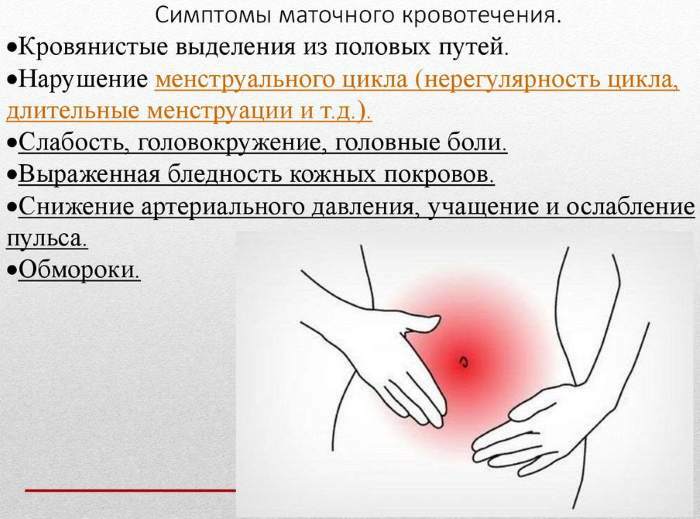
During menstruation, it is usually not abundant. Abundant menstrual flow can be observed with the development of various gynecological diseases.
The mechanism of development of bleeding during surgery, childbirth or abortion occurs due to trauma to the vessels located in the uterine cavity. The same goes for injuries.
After childbirth or abortion, bleeding from the uterine cavity can be quite abundant, but with good contractility of this organ, it quickly stops on its own.
Uterine bleeding can develop at any age. But, as a rule, women of childbearing age most often seek medical help. This is due to the large number of childbirth or other manipulations in this category of patients.
Symptoms of uterine bleeding:
- Profuse bleeding.
- Stomach ache.
With heavy bleeding, the following symptoms are observed:
- Pallor of the skin.
- Cyanosis of the nail bed.
- Thirst.
- Dizziness.
- Shortness of breath.
- Increased heart rate.

Uterine bleeding, developing due to pathological reasons, can be distinguished from menstruation by the following signs:
- The intensity of the selection.
- Increase in duration.
- Shortness of breath and increased heart rate.
- Dizziness.
- Thirst.
The action of hemostatic drugs
To stop bleeding from the uterus, you can use hemostatic drugs. Hemostatic drugs are medications that work to increase the number of platelets in the peripheral blood. With the introduction of these drugs, an increased activation of the coagulating functions of the body occurs.
Some drugs can stop bleeding after a few minutes, while others have a cumulative effect. In this case, taking medications should be systematic.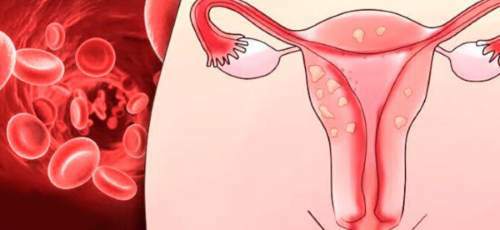
In addition, in the treatment of uterine bleeding, funds are used to increase the contractile function of the uterus. In severe cases in a hospital, transfusion of blood-replacing elements is used.
How to stop bleeding during menstruation at home
If menstruation is very heavy or there is a suspicion of the development of pathological bleeding, then in this case, the amount of blood secreted can be reduced with the help of drugs. And also not the last place in the therapy and prevention of uterine bleeding is taken by the use of medicinal herbs.
Medicines
Medicines are used both for the emergency stop of bleeding and as a means of cumulative effect. The funds can be taken orally in the form of tablets, as well as injected intramuscularly or intravenously. For this, solutions for injection are used.
For women who often experience heavy menstrual bleeding, it is recommended to use pills. You can start priming a few days before the expected menstruation.

| Hemostatic agent | Route of administration and dosage |
| Dicinon | Inside, 750 mg per day, starting 5 days before the expected menstruation until the 5th day of the new menstrual cycle. |
| Vikasol | Intramuscularly, 2 ml once a day. |
| Tranexam | Inside, 250 mg (1 tablet) 3 times a day. |
Folk hemostatic agents
Folk remedies for stopping uterine bleeding can be combined with medications. Various infusions and decoctions are used for treatment. Many of them need to be taken for a cumulative effect, while others as a means to stop bleeding urgently.
| Means for alternative treatment | Cooking method |
| Horsetail and shepherd's purse decoction | To prepare this broth, take dry leaves of horsetail and shepherd's purse, boil in water for 30 minutes. And then let it brew for 2 hours. You need to drink such a decoction in 2 tbsp. l. 3 times a day. |
| Yarrow flower decoction | This broth is prepared from dried yarrow flowers. To prepare it, pour the required amount of dry powder with boiling water, let it brew and filter through a sieve. You can drink this broth like tea, 1 glass 3 times a day.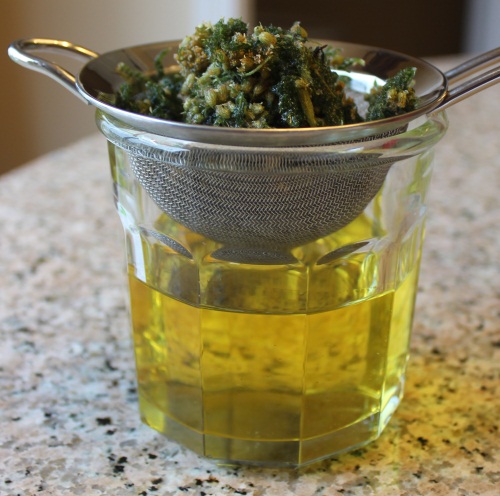
|
| Viburnum decoction | To do this, you need to take 3 tbsp. l. dry viburnum berries, pour boiling water over them and let it brew for several hours. You can drink 1-2 glasses 3 times a day. |
| Nettle decoction | To do this, you need to take 2 tbsp. l. dry nettle powder, boil in water. Strain and let it brew for 2 hours. You need to take such a decoction in 2 tbsp. l. 3 times a day. |
| Infusion of water pepper | To prepare this infusion, you need to take 1 tbsp. l. herbs, pour it with hot boiled water and let it brew. Take the composition of 3 tbsp. l. 3 times a day. |
| Orange peel remedy | Boil the peel of several oranges in water. Strain the resulting broth, add a little sugar. Take the remedy for 4 tbsp. l. 3 times a day. |
| Infusion of barberry root | This infusion is sold in the form of a pharmacy preparation. You need to take it 30 drops 2 times a day. |
For gynecological diseases
Gynecological diseases are the most common causes of uterine bleeding.
The most common pathologies include:
- Endometriosis
- Myoma.
- Endometrial hyperplasia.
- Tumors of the reproductive system.
Endometriosis
Endometriosis is a disease in which there is an overgrowth of endometrial cells. The endometrium can be found not only in the uterine cavity, but also affecting the cervix, fallopian tubes, ovaries and even the abdominal cavity.
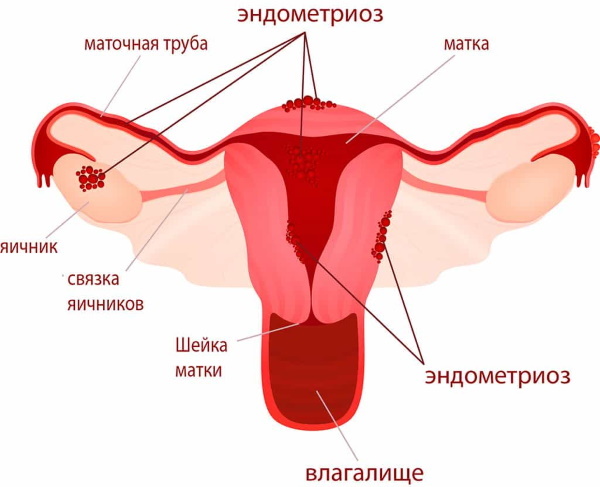
Under the action of hormones (during menstruation), the endometrium is rejected, as a result of which bleeding develops. It can be not only during menstruation, but also in the middle of the cycle or a few days after menstruation.
Endometriosis must be treated as this condition can lead to the development of various complications, including infertility.
The main symptoms of endometriosis are:
- Pain in the lower abdomen.
- Profuse bleeding.
- Menstrual bleeding.
Endometriosis is diagnosed by ultrasound or gastroscopy. Uterine bleeding with endometriosis can be controlled by various methods. In this case, one should proceed from the degree of the disease and the patient's well-being.
| Treatment | The ways |
| Surgery | Treatment is carried out using laparoscopic techniques, which are currently considered the most effective. In advanced cases of profuse bleeding, invasive bleeding control techniques are used. |
| Drug treatment | For the treatment of endometriosis, oral contraceptives and hormonal drugs are used. They significantly reduce the likelihood of bleeding. But if bleeding occurs, then in this case the following medications are used:
|
| With the help of folk remedies | Decoctions are used from the following plants:
|
Myoma
Fibroids are one of the most common causes of bleeding in women of all ages.
Myoma is a benign formation that is localized in the uterine cavity. In reproductive age, it can reach quite large sizes, but subsequently decrease. Due to the fact that myoma interferes with the normal contractile function of the uterus, uterine bleeding occurs.
The main symptoms of fibroids include:
- Prolonged periods.
- Profuse discharge during menses.
- Unstable menstrual cycle.
- Bloody discharge between periods.
- Painful periods.
Myoma is discovered by chance during an ultrasound examination, since for a long time it does not manifest itself in any way. There are several treatments for fibroids. Distinguish between medical and surgical treatment.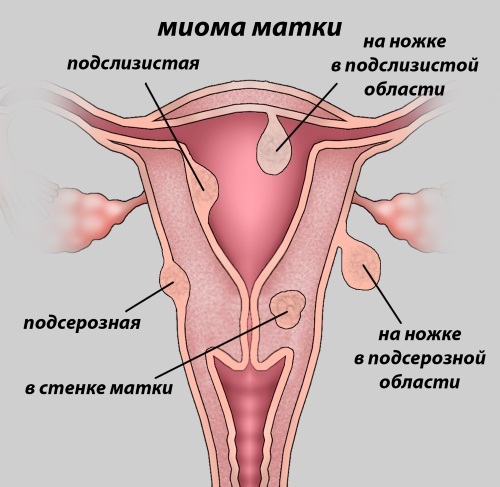
Surgical treatment is carried out using laparoscopic methods. Previously, removal of fibroids together with the uterus was used to remove fibroids, at this stage organ-saving surgery is performed. But in the event that the fibroid has not reached too large a size. It is possible to stop bleeding from the uterus with fibroids with the help of medications.
The following drugs are used to urgently stop bleeding:
- Dicinon.
- Aminocaproic acid (for intravenous administration).
- Vikasol (in tablets, according to individual dosage).
- Oxytocin solution (for the contractile function of the uterus, in a hospital setting).
Endometrial hyperplasia
Endometrial hyperplasia is an excessive enlargement and proliferation of the endometrium in the uterine cavity. It occurs during menopause, as well as in women of childbearing age with the presence of various gynecological diseases.
Endometrial hyperplasia has symptoms similar to other pathologies of the reproductive system. This condition remains unnoticed for a long time, hyperplasia is detected when undergoing a control ultrasound examination or if there are complaints of painful and heavy menstruation.
The main symptoms of endometrial hyperplasia include:
- Painful periods.
- Instability of the menstrual cycle.
- Long duration of menstrual bleeding.
- Profuse menses.
- Pronounced duration of the menstrual cycle over 35 days.
Bleeding with endometrial hyperplasia is quite common. It may not present significant discomfort to a woman and manifest itself in the form of abundant cyclic discharge, or it can be quite abundant. With the latter option, bleeding is often stopped in a hospital setting.
Bleeding control has several goals:
- Stopping bleeding directly.
- Prevention of repeated bleeding.
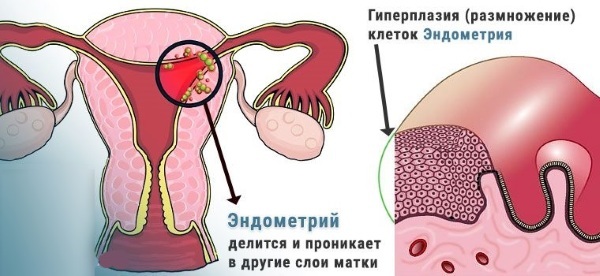
You can stop bleeding from the uterus using the following methods:
- Hormone therapy. Used drugs based on sex hormones, which have been used for quite a long time. To stop bleeding, estrogen-based drugs are used, they affect hemostasis and restrain the development of bleeding.
- Oxytocin solution (0.5-1 ml) or methylergometrine 1 ml (0.2%) intramuscularly.
- Extract from water pepper (20 drops 3 times a day).
- The use of hemostatic drugs (Ditsinon, Vikasol). Intramuscular or intravenous administration of drugs is used, and then a gradual transition to tablets.
- Transfusion of blood substitutes (in a hospital setting).
- Physiotherapy procedures.
Physiotherapy procedures are prescribed for the fastest recovery, as well as prophylaxis to prevent recurrent bleeding.
The following methods are distinguished:
- Medicinal electrophoresis.
- Electrostimulation of the cervix.
- Electroplated collar.
Caused by spontaneous miscarriage
A spontaneous abortion is the spontaneous termination of pregnancy (miscarriage) for up to 20 weeks. After 20 weeks of gestation, a spontaneous abortion is called preterm labor. Spontaneous abortion occurs in about 20% of pregnancies.
A spontaneous abortion can be caused by various factors:
- Bacterial or viral infection of the fetus.
- Genetic predisposition.
- Habitual miscarriage.
- Gynecological diseases.
- Injuries.
- Chromosomal abnormalities of the fetus.
The symptoms of a spontaneous abortion include the following:
- Heavy bleeding.
- Pallor of the skin.
- Pain in the abdomen.
When choosing therapy for spontaneous abortion, the correct clinical assessment of the woman's condition is important. For this, an ultrasound scan is carried out. Since the doctor needs to know at what stage the spontaneous abortion is and whether it is possible to maintain the pregnancy.
If a spontaneous abortion is accompanied by the development of massive bleeding, then in this case the following drugs are prescribed:
-
Traneksan(tranexamic acid). On the first day, intravenous administration of the drug is carried out at the rate of up to 1 thousand mg of the drug per day. And then the transition to the tablet form of the drug is gradually carried out. After the transition, the dosage of the drug is 750 mg per day.
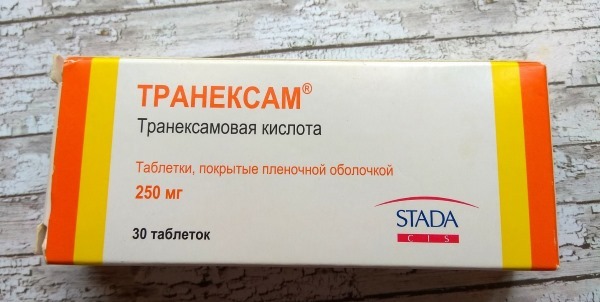
- Antispasmodic drugs (to relax the muscle fibers of the uterus). For this purpose, No-shpa is administered intramuscularly or intravenously. Then there is a transition to tablets.
If the pregnancy could not be preserved, the remains of the ovum are aspirated using a vacuum or in the form of a minor gynecological operation.
With menopause
Bleeding during the onset of menopause (menopause) or before its onset develops as a result of the action of hormones. Gradually, with age, the number of hormones produced decreases, the normal functioning of the ovaries is disrupted, and the contractile function of the uterus also decreases. This leads to the development of bleeding between periods.
Directly menstruation in premenopause is reduced in duration and abundance. But more common are acyclic bleeding, which can be uncomfortable for a woman.
And although uterine bleeding during this period remains an absolutely physiological phenomenon, if it bothers the patient, some medications or folk remedies may be required.
To regulate the hormonal background during this period, the doctor prescribes hormonal preparations with a sufficient content of sex hormones, as well as medications to reduce bleeding. These include Ditsynon or Vikasol.
These drugs are prescribed for continuous use, starting from the 5th day before the onset of the expected menstruation and ending with the 5th day of the new menstrual cycle. This applies to premenopause, when menstruation is still observed.
During menopause, bleeding may indicate hormonal disorders, as well as the development of pathological diseases of the reproductive system (fibroids, malignant neoplasms).
To diagnose the exact cause, a comprehensive diagnosis is assigned.
If the reasons lie in the physiological extinction of the reproductive function, then in this case hormonal drugs, hemostatic drugs in tablets, as well as the intake of medicinal herbs are prescribed. During menopause, you can drink decoctions of nettle or yarrow.
Uterine bleeding can be quite dangerous for a woman and threaten with the development of complications. But, knowing how to stop bleeding from the uterus, you can avoid negative consequences for the body and the development of dangerous complications.
Video about bleeding from the uterus
Malysheva about uterine bleeding:

